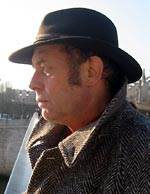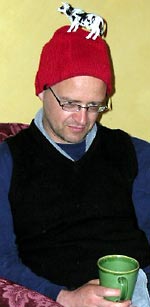B O O K R E V I E W
Michael Farrell
reviews
The Rothenberg Variations
by Pierre Joris
Wild Honey Press 2004
Michael Farrell lives in Melbourne, Australia. He has poems in recent issues of Heat, Southerly and Fulcrum. His book is ‘ode ode’ (Salt Publishing 2003).
This review is
680 words
or about
4 printed pages long
the lyrical never says die
...to honour Jerome Rothenberg on his 70th birthday ...
As far as Pierre Joris’ variations are variations on a theme, they are so on the theme of Rothenberg rather than a theme by; they are variations on arrangement, closer to Cage’s mesostics than anything by O’Hara, for example. They were made from each 7th word of the first fifteen poems of Rothenberg’s first and last books. Joris admits to ‘excisions, additions, subtractions and divisions’.
‘where sun still black
fish smells us in
the long city
at large in the wound
of our curving vagina’
(stanza 1 of rothenberg variation # 1)
‘large thumb a drop
he but body
old cupped in
the cruel’
(stanza 2 of rothenberg variation # 13)

Pierre Joris
These resemble the cool, post-language post-imagist minimalism of Douglas Messerli; alternatively the enigmatic expression of a medieval witch or fairytale serf. I don’t have the benefit of possessing Rothenberg’s first and last books, merely his New Selected Poems, to measure the relative disjunction; Joris’ gifts of chance seem to offer an objective take: returning Rothenberg to himself in objective form. Excisions etc aside (the very names of these changes suggest a scientific / mathematic method), the adoption of a chance procedure as a tribute may seem a very particular if not downright subjective approach.
Is the number of variations (fifteen) a coincidence? Not only does my edition of Rothenberg’s New Selected Poems cover a fifteen year period (1970-1985), but it contains the previously uncollected ‘15 Flower World Variations’:
‘in wilderness I am
that only melon
flowering
& splitting
sending vines out
everywhere’
In The Rothenberg Variations Joris demonstrates an example of ‘a nomadic poetics’: argued for in his recent book of that name (Wesleyan 2003). The process of taking the 7th word evokes a moving across the terrain of Rothenberg’s work: not so much from oasis to oasis picking a date or jewel of water (emphasising the picker’s aesthetics or sensuality) but whatever’s found at pre-determined distances: whether it’s sand, dung or a coke can. Writing becomes a tribute to language rather than to the self:
rothenberg variation # 4
everything gives as
horses give a language
a town gives tigers
a scarf gives voice
a church even gives heart things
no, a thunderbolt on a fish
who quakes & raises us
pursuing heart things
a way
even
a language
out-hinged
but a way
Such an approach suggests modesty, while at the same time a kind of global democracy: i.e. one that comes from the world rather than is imposed on it. (And if we can select only so much from the world why not every seventh element? And if we want to honour the world then why not with itself?) The variations are not a tribute to Joris’ ability to emulate or parody Rothenberg’s style; nor an attempt at portraiture, at evoking memories of Rothenberg’s life, nor one to come to terms with his contribution to world poetry (Joris and Rothenberg collaborated on the two volume Poems For The Millenium). Yet even to read them in this negative way is perhaps oldfashioned. They are examples of Joris’ skill in composition as well as a lid dip to Rothenberg’s original word choices. They suggest the original poems still have life. Though its radical nature has profound implications, their presentation in the form of a Wild Honey chapbook suggests both the work’s gift nature and small claims. The dj-as-artist concept has peaked, the remix has been replaced by a return to the original (rock) song: albeit in a heavily retro style. Audiences want new feelings; the lyrical never says die. But it does say it belongs to noone, and that it’s made of words:
rothenberg variation # 15
sang 1907 loneliness
boldly the ice chameleons
ground teeth, he space
with geisha ghosts
we lost a flag a frog too
but his hat
scratching a green doubt
his gang too
all sang / wept found
the babe’s transforming
dares the left moon
boy moves
against him but by him
of him
speaks sweet napoleon
a freedom
bones transforming

Michael Farrell
Michael Farrell lives in Melbourne. He has poems in recent issues of Heat, Southerly and Fulcrum. His book is ‘ode ode’ (Salt Publishing 2003).
it is made available here without charge for personal use only, and it may not be
stored, displayed, published, reproduced, or used for any other purpose
This material is copyright © Michael Farrell and Jacket magazine 2005
The Internet address of this page is
http://jacketmagazine.com/27/farr-joris.html
